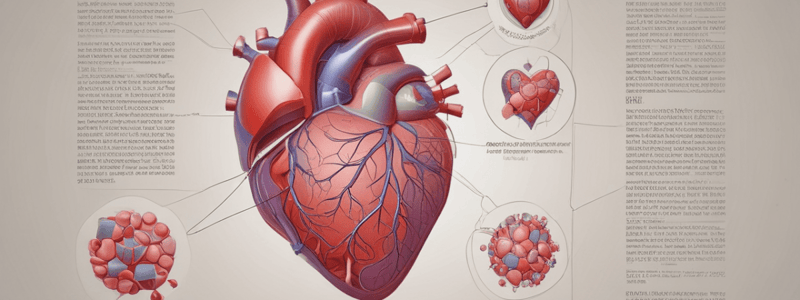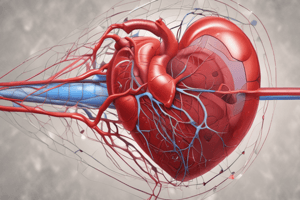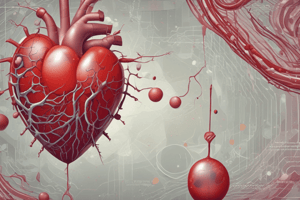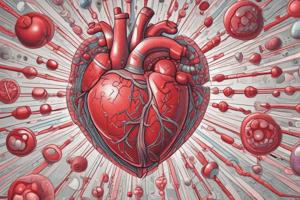Podcast
Questions and Answers
What is the primary mechanism of action of anticoagulants?
What is the primary mechanism of action of anticoagulants?
- Interfering with the conversion of fibrinogen to fibrin (correct)
- Breaking down fibrin clots
- Stimulating blood clot formation
- Inhibiting blood vessel constriction
What is the primary use of thrombolytic drugs?
What is the primary use of thrombolytic drugs?
- To prevent and treat deep vein thrombosis and pulmonary embolism
- To stimulate blood clot formation and prevent bleeding
- To treat acute myocardial infarction and dissolve blood clots (correct)
- To prevent cerebral thrombosis and myocardial infarction
What is a common adverse reaction of anticoagulant therapy?
What is a common adverse reaction of anticoagulant therapy?
- Blood vessel constriction
- Increased heart rate
- Mild to severe bleeding (correct)
- Hair growth
What is the name of the oral anticoagulant mentioned in the text?
What is the name of the oral anticoagulant mentioned in the text?
What is the purpose of preventing cerebral thrombosis?
What is the purpose of preventing cerebral thrombosis?
What is the reference cited in the text?
What is the reference cited in the text?
What is the name of the injection-only anticoagulant mentioned in the text?
What is the name of the injection-only anticoagulant mentioned in the text?
What is the common use of anticoagulants and thrombolytic drugs?
What is the common use of anticoagulants and thrombolytic drugs?
What is the primary mechanism of action of Cardiotonics?
What is the primary mechanism of action of Cardiotonics?
What is the primary use of Antiarrhythmic drugs?
What is the primary use of Antiarrhythmic drugs?
What is the adverse reaction of Cardiotonics that is related to the nervous system?
What is the adverse reaction of Cardiotonics that is related to the nervous system?
What is the primary use of Peripheral vasodilating drugs?
What is the primary use of Peripheral vasodilating drugs?
What is the primary mechanism of action of peripheral vasodilators?
What is the primary mechanism of action of peripheral vasodilators?
What is the condition where the heart cannot pump enough blood to the body tissues?
What is the condition where the heart cannot pump enough blood to the body tissues?
What is the adverse reaction of Antiarrhythmic drugs that is related to the cardiovascular system?
What is the adverse reaction of Antiarrhythmic drugs that is related to the cardiovascular system?
What is the normal range for systolic blood pressure?
What is the normal range for systolic blood pressure?
What is the primary mechanism of action of Antiarrhythmic drugs?
What is the primary mechanism of action of Antiarrhythmic drugs?
What is a potential adverse reaction of peripheral vasodilators?
What is a potential adverse reaction of peripheral vasodilators?
What type of drug is used to treat atherosclerosis?
What type of drug is used to treat atherosclerosis?
What is the term used to describe the deposits of fatty plaques on the inner wall of arteries?
What is the term used to describe the deposits of fatty plaques on the inner wall of arteries?
What is the main effect of hypertension on the body?
What is the main effect of hypertension on the body?
What is the primary mechanism of action of diuretics?
What is the primary mechanism of action of diuretics?
What is a potential complication of hypertension?
What is a potential complication of hypertension?
What type of drug is used to reduce blood pressure?
What type of drug is used to reduce blood pressure?
What is the primary function of the cardiovascular system?
What is the primary function of the cardiovascular system?
What type of drugs are used to treat disorders related to blood clotting?
What type of drugs are used to treat disorders related to blood clotting?
Which type of drugs are used to treat heart diseases?
Which type of drugs are used to treat heart diseases?
What is the primary function of the heart in the cardiovascular system?
What is the primary function of the heart in the cardiovascular system?
Which type of drugs are used to treat disorders of blood vessels?
Which type of drugs are used to treat disorders of blood vessels?
What is the term for high levels of lipids in the blood?
What is the term for high levels of lipids in the blood?
Which type of drugs are used to treat abnormal heart rhythms?
Which type of drugs are used to treat abnormal heart rhythms?
What is the primary function of blood vessels in the cardiovascular system?
What is the primary function of blood vessels in the cardiovascular system?
What is the primary function of LDL in the body?
What is the primary function of LDL in the body?
What is the mechanism of action of anti-hyperlipidemic drugs?
What is the mechanism of action of anti-hyperlipidemic drugs?
What is the term for a clot that has broken loose from the wall of a blood vessel and is carried along by the bloodstream?
What is the term for a clot that has broken loose from the wall of a blood vessel and is carried along by the bloodstream?
What is the result when an embolus enters a smaller vessel?
What is the result when an embolus enters a smaller vessel?
What is a potential adverse reaction of anti-hyperlipidemic drugs?
What is a potential adverse reaction of anti-hyperlipidemic drugs?
What is the purpose of reducing LDL and total cholesterol levels?
What is the purpose of reducing LDL and total cholesterol levels?
What is the term for the formation of a clot in a blood vessel?
What is the term for the formation of a clot in a blood vessel?
What is the benefit of reducing triglyceride levels?
What is the benefit of reducing triglyceride levels?
Flashcards are hidden until you start studying




